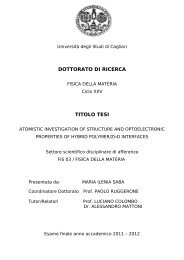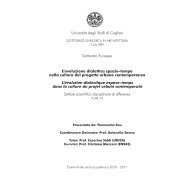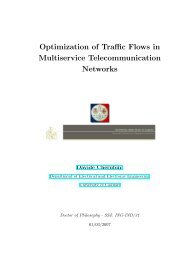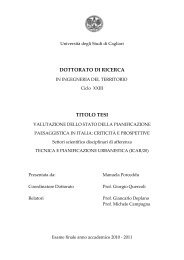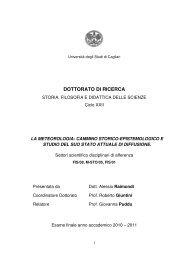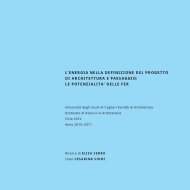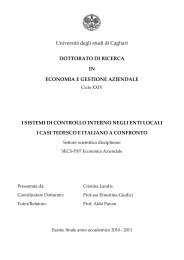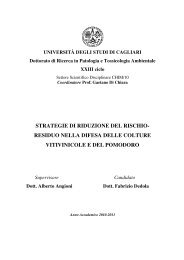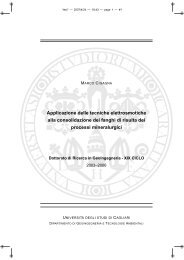The only truly alien planet is Earth. - UniCA Eprints - Università degli ...
The only truly alien planet is Earth. - UniCA Eprints - Università degli ...
The only truly alien planet is Earth. - UniCA Eprints - Università degli ...
Create successful ePaper yourself
Turn your PDF publications into a flip-book with our unique Google optimized e-Paper software.
inseguono 185 . Essa è funzionale alla logica del processo evolutivo che ha segnato la storia<br />
dell’uomo fin dalle origini e che trova il suo punto di svolta nella catastrofe stessa. Ma attenzione, il<br />
loro obiettivo non è l’autod<strong>is</strong>truzione, bensì la trascendenza: «<strong>The</strong> d<strong>is</strong>aster motif in Ballard’s fiction<br />
<strong>is</strong> thus grounded, not in a nihil<strong>is</strong>tic w<strong>is</strong>h for extinction, but in the desire for transcendence» 186 .<br />
Questa trascendenza verso cui paiono tendere i protagon<strong>is</strong>ti della tetralogia del d<strong>is</strong>astro ballardiana<br />
nella lettura dei diversi critici, da Gregory Stephenson a Warren Wagar a Peter Brigg, si presta a<br />
interpretazioni di natura differente, da quella m<strong>is</strong>tica o addirittura religiosa a quella es<strong>is</strong>tenzial<strong>is</strong>ta,<br />
da quella nichil<strong>is</strong>ta a quella junghiana. Ciò che appare difficilmente confutabile è che i diversi<br />
d<strong>is</strong>astri in cui si trovano coinvolti i personaggi siano come dei setting cinematografici, come uno<br />
sfondo tridimensionale sul quale vengono proiettate le loro ossessioni. La catastrofe naturale come<br />
cornice e pretesto delle dinamiche psicologiche dei personaggi principali 187 .<br />
Un fenomeno all’orizzonte del percorso di questi personaggi è quello dell’entropia, come<br />
accennato: il termine è mutuato dalla f<strong>is</strong>ica, e indica il grado di d<strong>is</strong>persione dell'energia nel<br />
passaggio da uno stato di ordine a uno di d<strong>is</strong>ordine. L’esaurimento dell’energia porta alla stasi,<br />
ovvero alla morte. Se applichiamo il ragionamento su scala <strong>planet</strong>aria otteniamo la fine<br />
dell’universo. Nel nostro caso, la tensione verso l’esaurimento energetico è un processo che<br />
riguarda l’interiorità dell’individuo, il suo inner space, che si manifesta nella forma della<br />
trascendenza 188 .<br />
185 «<strong>The</strong>y are passive; worse, they embrace and collude with catastrophe. Ballard’s inversion of the genre <strong>is</strong> seen in<br />
these terms: “Contrary to most treatments of the theme, the four books are not centred on the frightful destructiveness of<br />
the cataclysm but on its awesome beauty… on the perverse desires, mad ambitions, and suicidal manias of aberrant<br />
personalities now free to fulfil fatal aspirations devoid of any rational motivation. If the traditional catastrophe initiates<br />
some musings about Brit<strong>is</strong>h masoch<strong>is</strong>m, Ballard's work goes beyond th<strong>is</strong> into all manner of death-driven perversity”<br />
[“Ballard” entry in Twentieth Century Science Fiction Writers, 2nd edition, ed. Curt<strong>is</strong> Smith, St. James Press, 1986,<br />
p.32]. […] <strong>The</strong> <strong>only</strong> action <strong>is</strong> towards the psychological acceptance of a “new logic”, embracing catastrophe and,<br />
seemingly, death. […] [<strong>The</strong>se] d<strong>is</strong>aster novels attempt a literal sub-version of the genre, reversing the perceived<br />
surface/depth structure to manifest its latent desires. If th<strong>is</strong> reading <strong>is</strong> accepted, one can see a certain consonance<br />
between the novels' sub-version and Baudrillard’s claim that the psychoanalytic “private scene” of the modern has been<br />
rendered transparent, ob-scene, in the postmodern.» R. Luckhurst, op. cit., pp. 293-295.<br />
186 G. Stephenson, op. cit., p. 41.<br />
187 «<strong>The</strong>re are, in these commentaries, at least four competing frames of reference for reading the catastrophe: the<br />
Jungian process of annealing a self-divided subjectivity; a specifically religious meaning of Apocalypse as redemption;<br />
an ex<strong>is</strong>tential process of moving from <strong>alien</strong>ated being toward a transcendent apprehension of Being; and a Camusian<br />
conception of an absurd universe. Apparent in all these readings <strong>is</strong> also the perhaps most ‘self-evident’ frame: the<br />
Freudian typography of subjectivity. <strong>The</strong> landscapes of the novels are those of the unconscious, a scenography of the<br />
‘secret’ desires of and for the catastrophe.» R. Luckhurst, op. cit. (1997), p. 47.<br />
188 «[…][A]t least in the context of Ballard’s work, its [entropy’s] cosmological extension designates a hypothetical<br />
tendency of the universe to attain a state of maximum homogeneity in which all matter <strong>is</strong> at a uniform temperature and<br />
eventually brings about the ‘heat death’ of the universe. Ballard’s concern with entropy allies him not <strong>only</strong> with other<br />
representatives of the Brit<strong>is</strong>h New Wave but also with a whole line of post-war novel<strong>is</strong>ts (many of them American)<br />
whose work d<strong>is</strong>plays an equally cons<strong>is</strong>tent v<strong>is</strong>ion of the universe as regressing to a state of absolute uniformity and<br />
inertness. […] If “<strong>The</strong> Voices of Time” seems completely devoid of the specific social and political subtext of<br />
[Pynchon’s short story] “Entropy”, Ballard’s use of the entropy metaphor nonetheless shares Pynchon’s v<strong>is</strong>ion of<br />
human life releasing energy at an accelerate rate and ready to succumb to a form of emotional and intellectual ‘heat<br />
death’. While Pynchon applies the entropy metaphor to the workings of society as a whole, Ballard <strong>is</strong> primarily<br />
- 61 -



